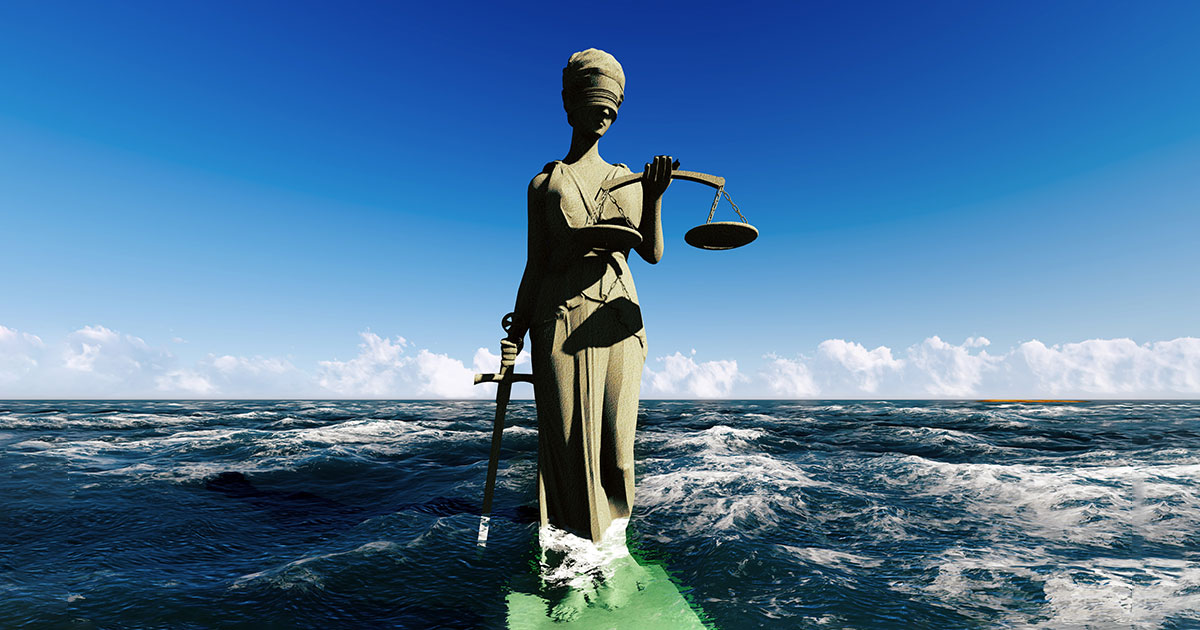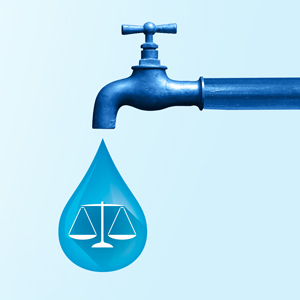
March 15, 2023 – In 2022, new administrative rules for PFAS in Wisconsin came into effect, not too long after the chemicals were found contaminating the drinking water in several Wisconsin communities, including Wausau, Rhinelander, and in Green Bay, among other places.
In fact, the EPA recently announced federal grants, including around $25 million for smaller Wisconsin communities, to address drinking water contamination by PFAS.
Water and water law have shaped Wisconsin since territorial days, and new challenges well beyond the scope of the 1972 Clean Water Act will dominate water-law topics in the next decades.
Wisconsin is a water-rich state, and its water resources are vital for agriculture, recreation, industry, drinking water, and countless other uses. Managing Wisconsin’s water resources for future generations presents several challenges, including plans for the management of emerging contaminants such as PFAS.
PFAS contamination is one small part of Wisconsin’s water management challenges. Other challenges include, among others:
balancing residential and commercial developments with public access to waterfronts, particularly in the areas of historic lakebed fill;
the new regulations for the protection and usage of shoreland and wetland areas in Wisconsin; and
keeping track of the current state of the Wisconsin Department of Natural Resources (DNR) authority on a wide range of permitting issues affecting groundwater in the aftermath of recent Supreme Court decisions.

These topics and more will be discussed in the half-day seminar “Water Law Challenges and Opportunities 2023” from State Bar of Wisconsin PINNACLE™ at the State Bar Center in Madison on April 12, 2023, with webcast seminars following.
The program will help you know the latest in water law developments, including
which water law challenges and programs are priorities for the DNR;
the impact of recent court rulings on groundwater management;
ways to balance public access with the need for lakebed development;
recent and proposed waterway and wetland regulations; and
the latest proposals to prevent and mitigate pollution from emerging contaminants
Water law is a complex area of law, touching on the areas of property law, environmental law, and public health and welfare, and it is important to know what resources are available and where to begin your research.
State Bar PINNACLE’s half-day, in-person Water Law seminar on April 12, 2023, will dive deeper into water law-related issues.
Water Law Resources from the Wisconsin Lawyer Magazine
In 2022, Wisconsin Lawyer magazine published a series of articles and research resources covering the basics of Wisconsin’s water laws and the issues that are catalysts for disputes about water use. See a list of these resources below.
Articles
Water, Water Everywhere: 50 Years of the Clean Water Act and Beyond, by Paul G. Kent, 95 Wis. Law. 22 (April 2022). Wisconsin has the third highest number of natural lakes of U.S. states but keeping these and other water resources clean and equitably available for all users is a challenge that increases by the day. Learn here about the basics of Wisconsin’s water laws and the issues that are catalysts for disputes about water use.
The Challenge of Wisconsin’s Water Abundance: Managing Stormwater in a Watershed Context, by Paul G. Kent, Erin O’Brien & Tracy Hames, 95 Wis. Law. 20 (May 2022). To effectively manage stormwater quantity and quality, we need to do so in the context of watersheds and hydrologic processes rather than as a series of discrete issues and programs.
Plugging the Holes in Wisconsin’s Groundwater Policy, by Prof. David A. Strifling, 95 Wis. Law. 40 (June 2022). Separate laws on groundwater and surface water withdrawal and the lack of a fully integrated regulatory scheme for high-capacity wells have more often led to conflict and uncertainty rather than to clarity. Wisconsin’s groundwater management regime is developing but still has gaps. The author discusses groundwater quantity and quality, the public trust doctrine, and interstate disputes.
Water Law Perspectives from the West, by Gregor MacGregor, 95 Wis. Law. 32 (July/August 2022). Understanding the backdrop of scarcity, the perceived stability surrounding property rights, and the value of water in a dry land will help Wisconsin lawyers learn from the western United States and their residents.
The Public Trust Doctrine: Managing Navigable Waters in the Public Interest, by Larry A. Konopacki, 95 Wis. Law. 26 (Sept. 2022). Wisconsin’s navigable waters are one of the state’s most valuable resources. The public trust doctrine plays a significant role in ensuring that they are managed in the public interest for all state residents and U.S. citizens.
This Land is Your Land: Keeping Public Trust Lakebeds and Riverbeds Open for the Public, by Michael Cain, 95 Wis. Law. 34 (Sept. 2022). Wisconsin’s navigable waters, lakebeds, riverbeds, and shorelines are subject to the state’s public trust doctrine. The author explains the doctrine and how tools developed by the state are used to protect these public riches.
Water Law in Native Nation Territories, by Prof. Richard A. Monette, 95 Wis. Law. 10 (Oct. 2022). Indian water rights law is complex, meandering through federal Indian law and several relatively distinct but interrelated legal doctrines. The likelihood of more disputes about water quality and quantity makes it especially important for lawyers in Wisconsin, home to several Indian tribes, to understand the relevant legal doctrines and concepts.
Water Quality Challenges: Nonpoint Sources and Emerging Contaminants, by Vanessa Wishart & Jane Landretti, 95 Wis. Law. 22 (Oct. 2022). Many water quality problems exist because a substance that was unknown or seemed harmless decades ago now is recognized as a pollutant. In the 21st century, state legislators and regulators and nongovernmental entities have devised ways to prevent or minimize pollution that previously was unfettered.
Riparian Rights in Wisconsin, by Mary Beth Peranteau, 95 Wis. Law. 28 (Nov. 2022). Disputes about use of and access to water regularly occur in Wisconsin and will continue to do so, especially as rainfall becomes less predictable. An understanding of riparian rights, rights attached to ownership and use of property adjacent to bodies of water, is essential for lawyers in all parts of the state.
Federal Funding and Wisconsin’s Water Infrastructure, by Melissa K. Scanlan & Misbah Husain, 95 Wis. Law. 8 (Dec. 2022). Acknowledging and rectifying harm caused to disadvantaged communities are key to environmental justice in the 21st century. With the help of Congress, Wisconsin and other states are trying to improve water infrastructure, especially in communities with high populations of low-income or non-white residents.
Research Resources
Legal Resources: Researching Wisconsin Water Law, by Jenny Zook, 95 Wis. Law. 45 (May 2022). You can find water law indexed under property law, environmental law, and public health and welfare. Water is further divided by type. Here are tips to help direct your research.
Legal Resources: Researching Stormwater and Flood Management, by Carol Hassler, 95 Wis. Law. 43 (July/August 2022). Stormwater and flood management is a field that combines expert knowledge with laws and regulation at multiple levels of government. Here is a resource list that includes quick links.
Water Law: Public Trust Doctrine Resources, by Elana Olson, 95 Wis. Law. 47 (Sept. 2022). The author points to legal resources about the public trust doctrine, which rises from language that has been in the Wisconsin Constitution since statehood in 1848.
Legal Resources: Researching Federal and State PFAS Regulations, by Jenny Zook, 95 Wis. Law. 35 (Oct. 2022). Regulation of PFAS has become a priority for municipalities, farms, manufacturers, and fire departments and firefighters, among others. Here are research tips for lawyers representing such clients.
Legal Resources: Researching Riparian Rights, by Jenny Zook, 95 Wis. Law. 51 (Nov. 2022). This article introduces lawyers to general, Wisconsin, and federal resources concerning riparian rights: water rights related to ownership of land next to surface water.
Legal Resources: Researching the Great Lakes Compact, by Jenny Zook, InsideTrack (Dec. 21, 2022). This article introduces lawyers to resources helpful when researching the Great Lakes Compact, including guidance documents and legislative materials.
